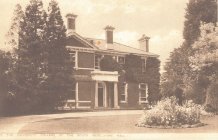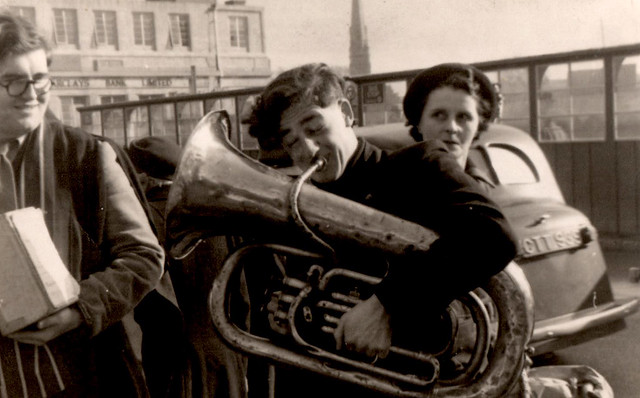Articles

A postcard of Hope Hall, commissioned by the University College of the South West as part of a fundraising appeal
Memories of UCSWE
The University of Exeter has been delivering quality education for more than 60 years, however the history of the institution goes back much further than this.
2017 marks 95 years since the University College of the South West of England (UCSWE) was founded in Exeter. Thousands of students were able to benefit from access to higher education at UCSWE between 1922 and 1955, when the University of Exeter received its Royal Charter.
We spoke to two alumni who attended UCSWE in the late 1940s and 1950s, to share their experiences of studying in Exeter in the post-war period.
John Mundy:
John Mundy (Physics, 1955) came to Exeter from Marlborough after two years National Service in the RAF. Although originally due to study in Geography in Bristol, John discovered a love of physics while training to become a wireless mechanic and made the switch to UCSWE.
John says: “The city was small and the centre damaged from the war and the country's economy was still depressed. Less than 2% of the population went to university and UCSWE had fewer than 900 undergraduates in only three faculties.
“National Service requirements meant a higher proportion of the male students had served in the military (myself included). I do not know how much effect that had but the British were still fighting all over the world in those days and most of us knew people that had been killed.”
There were only eighteen Physics students back then and John kept in touch with half of them following final exams. Many went on to have impressive careers in science, including John himself, who moved first to Canada following graduation and then on to America in 1967.
He says: “My graduate supervisor, Dr Grew told me I had to go to North America and broaden my experience. In 1958 I was awarded a National Research Council of Canada Post Doctoral Fellowship and spent two years in Ottawa. The Physics Division Head was Gerhard Herzberg (who was awarded the Nobel Prize in Chemistry in 1971). My doctoral thesis was on diffusion in gases.
“In Canada I joined a very powerful solid state physics group and I had to study very hard. This was the last position I applied for, as from then I was invited to University of Maryland as a visiting scientist, then UKAEA Harwell as a Senior Research Felllow, Chalmers Technical University in Gothenberg as a visiting professor, and finally to Argonne National Laboratory in Chicago as a staff member in the Materials Science Division.”
After this, John worked for the Department of Energy in Washington on materials research programmes in universities, institutes, and government laboratories all over the USA, before retiring in 1998.
John has fond memories of his time at UCSWE, where he was a member of the Boat Club and the Physics Society, and of the fascinating people he met when there.
“There were a couple of dozen ex-military studying at Exeter. We were used to rising early and usually had studied for a couple of hours before breakfast. In the evenings we would finish the day's studying early and get together in a pub (mostly The Black Horse, The White Hart, Double Locks and the Turf) by eight.” he says.
“A number of societies would invite excellent speakers from many places and it always appeared easy to bring in good speakers. It was these talks, and the meeting with other students from all over UK, Europe, Africa, India and America that were the most enjoyable part of Exeter. The small number of students probably resulted in both more interaction with the city and a greater 'mix' of students with different backgrounds.
“Money for new facilities was hard to find. When I started rowing in October 1952 EUBC had one racing four that had been built for the London Olympics in 1948. We kept it under a tarpaulin in an open shed at the back of the Double Locks Hotel. Now the Boat Club has a state of the art boat house and a former Olympic coach – very different.”
John now lives in the sunny climes of Florida, USA, but has made the trip back to campus on several occasions for reunions and holidays. Including in 2005 for the celebration of University of Exeter Charter, which was particularly special as he was a graduate student at the Washington Singer in 1955 when Queen Elizabeth presented the charter.
Eric Millward:
Eric Millward (General Science, 1950) arrived at Exeter in September 1948 on a Technical State Scholarship to do a three year Special Chemistry course.
However, after suffering several attacks of Meniere's disease (the first of which happened during registration) he switched to a two year General Science course in Chemistry, Physics and Pure and Applied Mathematics.
Eric says: “I travelled each term to and from my home in Stockport in North Cheshire so the question arises as to why I chose Exeter. I wasn’t awarded my State Scholarship until August of 1948 by which time there were no places remaining at, say, Manchester. My only choices were Hull, Southampton or Exeter. I plumped for Exeter for two reasons neither of which was rational. Firstly I had just returned from an enjoyable YHA cycling tour of the South West with a friend, and secondly Exeter was a good distance from my home and I needed to escape. Of course, mid-way through the first term I was homesick.”
Eric was social secretary at Bradninch Hall and says his best memories are all of social occasions. Being the organisation for students not in a Hall of Residence meant that they did not have a convenient meeting place so met in a temporary cafe behind the Gandy St Building (Bradninch Place) always referred to as ‘KAYF’.
“I was a member of the Freshers’ Choir under Arthur Root and this led to performances of mock operettas at the 1949 and 1950 Rag Week concerts in the Washington Singer Building (The Block) in which I played major roles. I already had some singing experience before arriving at Exeter and that remained my main hobby until my hearing failed.” says Eric.
“I also attended a few meetings of the Vintage Film Society where I remember seeing ‘The Blue Angel’ featuring Marlene Dietrich and Herbert Jannings. At a showing of the silent film ‘The White Hell of Pitz Palu’, the hero and heroine become stranded on an icy ledge in the Bernese Alps and seem likely to perish until the hero points to a tiny spot in the sky. It is Ernst Udet a German flying ace. In the tense silence one word appears on the screen ‘UDET!’. This my sense of humour could not resist and I blurted out “Udet up dere?”. The dramatic atmosphere was destroyed and I was declared persona non grata after that.”
Eric also played football at university, joined the Debating Society and got involved in music, at one point acquiring a tuba.
He says: “I don’t recall where I got it from but it was enormous and very loud. I would sit on the stairs at my lodgings in Culverland Road and try to master it. Eventually my landlady banned it as I was terrorising the cat!
“From the Debating Society, memorable motions were ‘That this house holds that Marks and Spencer’s have done more for civilisation the either Marx or Spenser’ and ‘That humanity would have been better served had Plymouth Rock landed on the Pilgrim Fathers rather than vice versa’.”
After graduation Eric began working as a Research Assistant at the Atomic Energy Research Establishment in Harwell, before moving to the UK Atomic Energy Authority (UKAEA) where he worked on the enrichment of Uranium 235 by gaseous diffusion.
In 1951 Eric returned to campus for Rag Week and has also visited Exeter several times since with his wife to show her around where he spent his student days. His children and grandchildren have gone to university and he thinks their experience was very different to his own.
Eric says: “I was at Exeter in the immediate aftermath of the war. Rationing was still in force and the city had suffered considerably from German air raids.
“In addition the social environment is now radically different from that existing in my undergraduate days. I am sure that modern academic life is much more rewarding in all respects than mine was. That is not say that I was unhappy but being on a two year degree course was a little stressful.”
Despite the stresses of a two year degree, overall Eric’s memories are happy ones and he is glad to still have mementoes of his time at Exeter. Including his original UCSWE blazer, purchased from Wippell’s complete with gold metal wire badge, but jokes that it no longer fits “and not because it has shrunk!”
If you have memories of UCSWE and would like to get in touch, please email Emma at alumni@exeter.ac.uk
Date: 15 May 2017

